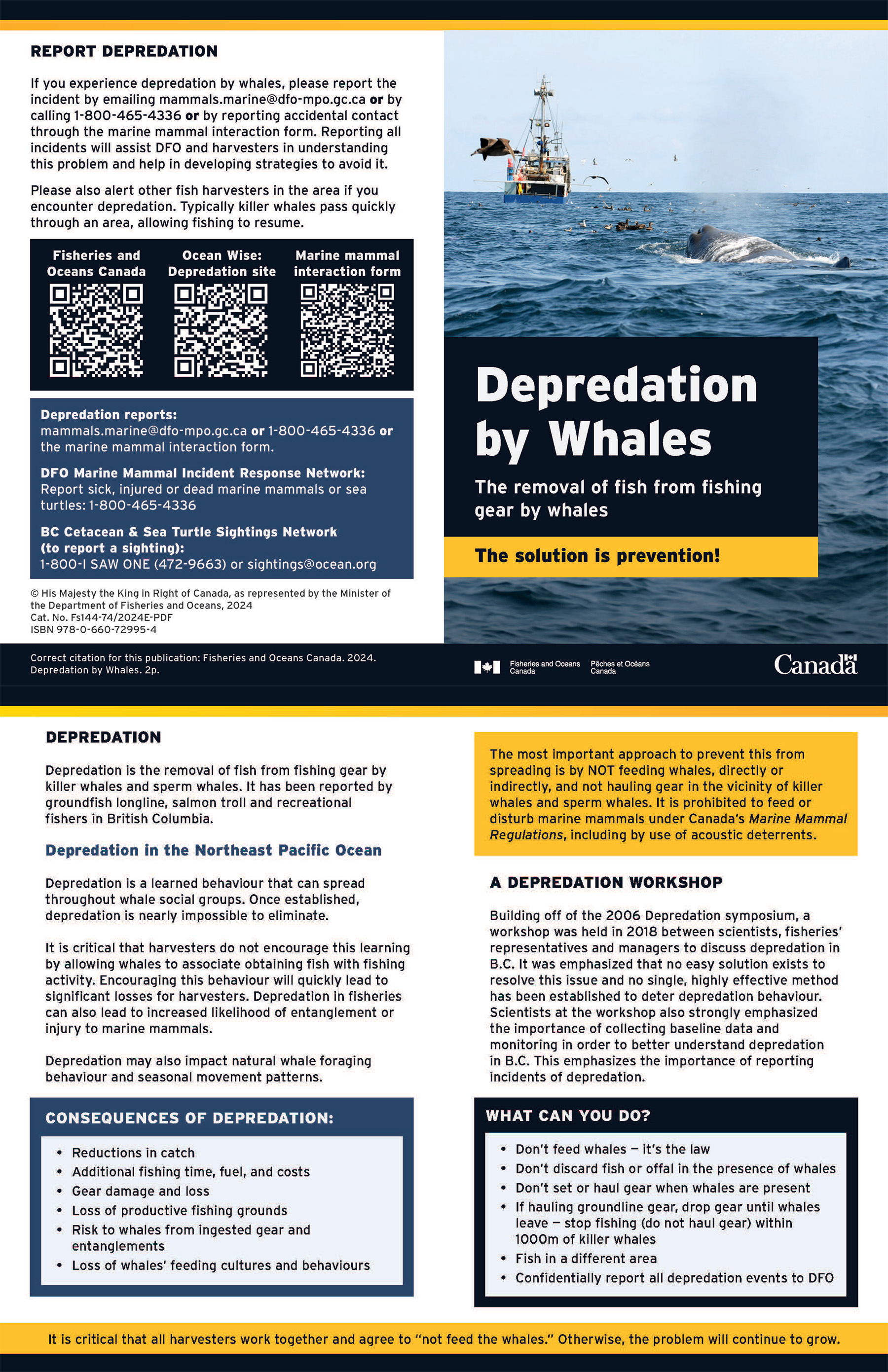Depredation by whales

Description: Depredation by whales
Depredation by whales: The removal of fish from fishing gear by whales
The solution is prevention!
Depredation
Depredation is the removal of fish from fishing gear by killer whales and sperm whales. It has been reported by groundfish longline, salmon troll and recreational fishers in British Columbia.
Depredation in the Northeast Pacific Ocean
Depredation is a learned behaviour that can spread throughout whale social groups. Once established, depredation is nearly impossible to eliminate.
It is critical that harvesters do not encourage this learning by allowing whales to associate obtaining fish with fishing activity. Encouraging this behaviour will quickly lead to significant losses for harvesters. Depredation in fisheries can also lead to increased likelihood of entanglement or injury to marine mammals.
Depredation may also impact natural whale foraging behaviour and seasonal movement patterns.
The most important approach to prevent this from spreading is by not feeding whales, directly or indirectly, and not hauling gear in the vicinity of killer whales and sperm whales. It is prohibited to feed or disturb marine mammals under Canada’s Marine Mammal Regulations, including by use of acoustic deterrents.
Consequences of depredation
- Reductions in catch
- Additional fishing time, fuel, and costs
- Gear damage and loss
- Loss of productive fishing grounds
- Risk to whales from ingested gear and entanglements
- Loss of whales’ feeding cultures and behaviours
A depredation workshop
Building off of the 2006 Depredation symposium, a workshop was held in 2018 between scientists, fisheries’ representatives and managers to discuss depredation in B.C. It was emphasized that no easy solution exists to resolve this issue and no single, highly effective method has been established to deter depredation behaviour. Scientists at the workshop also strongly emphasized the importance of collecting baseline data and monitoring in order to better understand depredation in B.C. This emphasizes the importance of reporting incidents of depredation.
What can you do?
- Don’t feed whales — it’s the law
- Don’t discard fish or offal in the presence of whales
- Don’t set or haul gear when whales are present
- If hauling groundline gear, drop gear until whales leave — stop fishing (do not haul gear) within 1000 m of killer whales
- Fish in a different area
- Confidentially report all depredation events to DFO
It is critical that all harvesters work together and agree to “not feed the whales.” Otherwise, the problem will continue to grow.
Report depredation
If you experience depredation by whales, please report the incident by emailing mammals.marine@dfo-mpo.gc.ca or by calling 1-800-465-4336 or by reporting accidental contact through the marine mammal interaction form. Reporting all incidents will assist DFO and harvesters in understanding this problem and help in developing strategies to avoid it.
Please also alert other fish harvesters in the area if you encounter depredation. Typically killer whales pass quickly through an area, allowing fishing to resume.
Fisheries and Oceans Canada: Pacific marine mammals and sharks.
Ocean Wise: Depredation site.
Marine mammal interaction form.
Depredation reports: mammals.marine@dfo-mpo.gc.ca or 1-800-465-4336 or the marine mammal interaction form
DFO Marine Mammal Incident Response Network: Report sick, injured or dead marine mammals or sea turtles: 1-800-465-4336.
BC Cetacean & Sea Turtle Sightings Network (to report a sighting): 1-800-I SAW ONE (472-9663) or sightings@ocean.org.
© His Majesty the King in Right of Canada, as represented by the Minister of the Department of Fisheries and Oceans, 2024
Cat. No. Fs144-74/2024E-PDF
ISBN 978-0-660-72995-4
Correct citation for this publication: Fisheries and Oceans Canada. 2024. Depredation by Whales. 2p.
- Date modified: